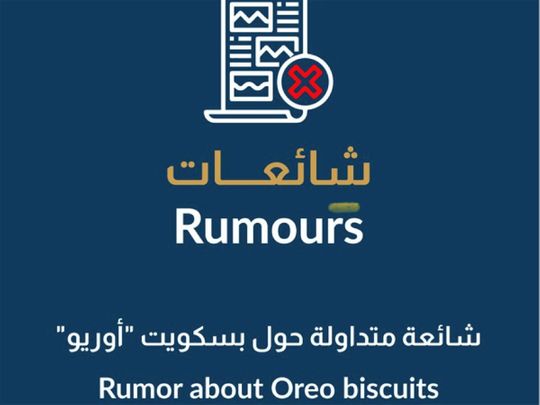
Abu Dhabi: UAE’s food regulatory authorities have debunked a rumour that questions the halal status of Oreo cookies sold in the country.
Taking to their social media platforms, the Ministry of Climate Change and Environment (MOCCAE) and the Abu Dhabi Agriculture and Food Safety Authority (Adafsa) also urged residents to rely only on reliable sources for information on food safety and permissibility.
“It has been circulated recently that Oreo biscuits are not halal because they contain pork and alcohol. We [would like to] inform you that [this] is incorrect,” the MoCCAE said.
“This claim is unsubstantiated and [baseless],” the Adafsa added in an alert on the subject.
Widespread rumours
The clarifications follow a series of tweets over the past few days enquiring about the permissibility or halal status of Oreo cookies, produced by American multinational confectionary Mondelez International, for Muslim consumers. Muslims are prohibited from consuming products that contain pork or halal as ingredients, which makes the product non-halal.
“The MoCCAE calls on the public not to circulate any news without verifying its credibility, and to communicate with the competent authorities to ensure the validity of information,” the ministry stressed.
Adafsa issued a detailed statement to explain why Oreo cookies are halal for consumers.
Alcohol rumour
“Regarding the first claim that the Oreo product contains a percentage of alcohol, there are many food products that contain small percentages of ethanol, resulting from natural fermentation that occurs during the processing steps. This is normal as the standard, the UAE.S GSO 2538:2021 for Maximum limits For Residues of Ethyl Alcohol (ethanol) in food products, controls these percentages. Adafsa verifies that that these products comply with the limits, ratios and controls contained in this standard. Moreover, this Standard strictly prohibits the addition of liquor, alcoholic products and ethyl alcohol (ethanol) to food during all steps of processing and handling,” the Adafsa said.
It added that the presence of ethanol in food does not compromise food safety or quality, but is done to ensure that products comply with the requirement of Islamic Sharia law.
“The approval of the official Gulf Sharia authorities was obtained prior to the issue of this Standard. The above Standard specifies the upper limits that must not be exceeded by ethyl alcohol (ethanol) resulting from natural fermentation in many food products, as what is stated in the Standard is relied upon as a criterion for accepting or rejecting those food products, including biscuit products. Ethanol is not usually considered as ingredient of and is not added to biscuit, which applies to the above mentioned product, but these products may contain very small proportions of ethanol because of natural fermentation during processing. This is considered normal and Adafsa verifies that these percentages do not exceed the limits referred to in the above Standard,” it said.
Pig fat claims
The authority also discredited a claim that the cookie contains lard or pig fat.
“The ingredients of biscuits vary in general, including Oreos. as they include flour, sugar, starch, cacao, corn syrup, fermentation agents, salt, oils or fats and emulsifiers such as lecithin). It may also include other food additives, colors, flavoring materials, etc. Some of the above ingredients such as lecithin, gelatin and other ingredients can be extracted from plant or animal sources, and furthermore, lecithin being extracted from animal sources does not mean exclusively that it is extracted from pig. It is not permissible to generalise that the presence of these ingredients in food products means that they are extracted from pig. Adafsa verifies the sources of the ingredients of food products, and does not allow the presence of any non-halal ingredients in those products, except in the case of products that are indicated on the food label as containing non-halal products or ingredients,” Adafsa said.
The authority clarified that product containing non-halal ingredients are only sold in designatied areas that are clearly labelled.
Regular testing
Both the MoCCAE and Adafsa clarified that ingredients in food products on sale in the UAE are regularly tested in accredited laboratories in order to ensure compliance and safety, and all non-compliant products are immediately withdrawn from stores.
“The Adafsa verifies the health and safety of all food products in the emirate’s markets, whether imported or local, before allowing their handling in the local markets. It further implements a set of programmes and activities to achieve this goal, including monitoring programs, laboratory testing, inspection activities, notification systems, follow-up of complaints, and monitoring any local, regional or global new emerging issues. Adafsa confirms that all Oreo consignments are inspected and their attached documents checked,” the authority said.
“Adafsa is keen to monitor news published about the conformity, suitability, health and safety of various food and agricultural inputs and products around the world, and tafterafter checking the validity of these alerts, it takes immediate preventive measures. It also takes corrective measures in case of detecting the presence of inappropriate, non-conforming, unfit products for human consumption, non-halal products or unauthorised ingredients, and these products are seized and withdrawn from the markets, with the necessary measures taken to prevent their future sales in the market,” it added.
https://twitter.com/adafsa_gov/status/1610960303940042756?s=48&t=sNu2ShWVWokeBBK2dTlc8w










